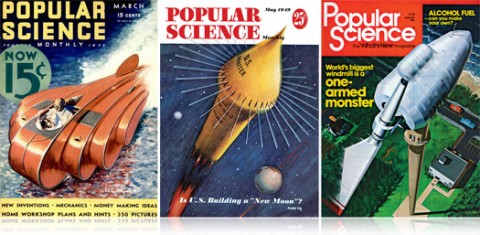
Popular Science is the fifth oldest continuously-published monthly magazine—a long way of saying that the magazine has done a fine job of maintaining a niche in a crazily fast-paced industry. Founded in 1872 by science writer Edward Youmans to reach an audience of educated laypeople, Popular Science today combines reviews of the latest gadgets with stories about innovation in design and science. It’s an organized mishmash of news about “the future now,” liberally defined. A recent issue included stories about the military’s use of 3‑D printing and an astrophysicist who questions whether Shakespeare wrote the entire Folio.
With that kind of breadth, the magazine’s archives cover just about everything. And it’s easy to browse through back issues, dating all the way back to 1872, since the magazine teamed up with Google to put a searchable archive on the web. The earliest issues, like this one from February 1920, feature color covers that bring to mind science fiction with a fascination for the imagined future.
One of the cool things about the magazine is its equal attention to new and old technology. Search for “scissors” and you will find this 1964 article about the mechanics of sharpening your own scissors. The archive also offers another search tool that returns results in a visual word frequency grid, which is especially cool if you click the “animate” button. Any social historians out there able to explain why the word “scissor” would appear so often in the mid-20th century?
Interestingly, although the word “internet” dates back to the 1960s, the word didn’t appear in the magazine’s pages until 1989.
Period advertisements are included, which adds to the fun. This issue from September, 1944 includes a house-advertisement on the table of contents page calling for all collectors of back issues to consider surrendering them for the war cause. “There’s a war going on and this is no time for sentiment,” the ad urges. “Grit your teeth and dig out those stacks of back numbers. Then turn them over to your local paper salvage drive!”
Kate Rix writes about education and digital media. Visit her website: .
Related Content:
The Alan Lomax Sound Archive Now Online: Features 17,000 Recordings
NASA Archive Collects Great Time-Lapse Videos of our Planet


I’ve recently become aware of the Shutterhand Generator I’d like to more about it.
I purchased the plans for the Shutterhand Generator. I wish I had spent the money elsewhere. Simply put, the Shutterhand Generator is an alternator for use in wind generators. The video was extremely misleading.
I was thinking of getting the plans for this generator. However, from what you say, it is not what it is advertised. According to Mr. Shutterhand, once it is put together and started in motion it runs by itself and produced 100%+ of the electricity you need to run your house. Plus you’ll be able to sell the excess back to the electricity co., because it is that good. You don’t need to plug it into anything to start it or keep it running. Once it is hooked up you just sit back and relax. You tell the elec. and oil co.‘s maybe next month or not. Is it that good? How much electricity does it produce? I’d like to know.
What is the truth about the Shutterhand generator. Is it only an alternator. did the guy who bought it and did not like it get all his money back. Has anyone else tried one. In fact has Anyone had success with any of the advertised devices. I am on a low ‚VERY, income and 71 . My OW would kill me if I bought one and it didn’t work. I have heard that most of, them; including; Tesla’s are only toys. I am looking to save £500 ayear on my bills. Any help out there ?
The Shutterhand manual is indeed totally unclear about how the device is supposed to be used (but at least I got my money back).
Where can I see or get a copy to look at. I would like to read the manual if possible. Is a copy on any of Popular Science’s Magazines? Where would I look to find it?
I as an editor at Popular Science from 1971 to 1973. It was my first job in journalism. I don’t have a very good archive of my own work. I’ve been looking for a piece I wrote on the Handford nuclear waste facility, sometime in the 1980s when I was a freelancer. It was called “Too Hot to Handle,” and it was nominated for a National Book Award. I was wondering if you could help me find it, as a friend has asked me to attend the premiere of a documentary on this subject in January. Thanks.